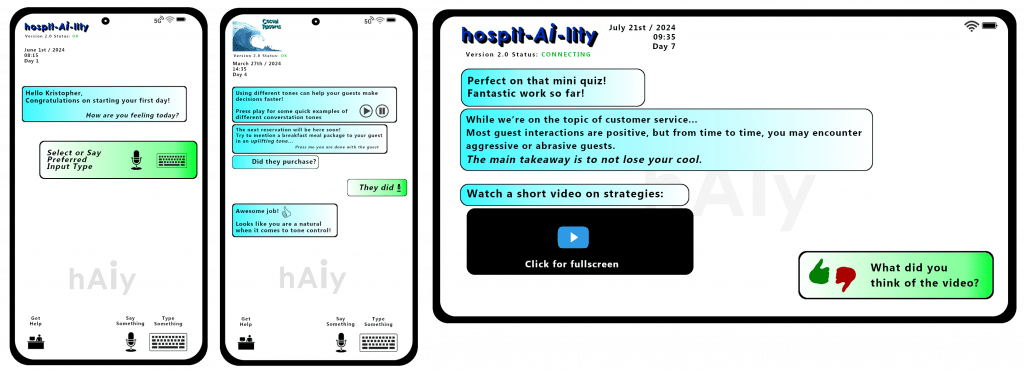Artificial Intelligence based technology has stormed into the mainstream and many industries are adopting the technology to improve efficiencies and drive business. The travel industry, specifically, has seen massive waves of AI adoption in both consumer facing technology and operational infrastructure. AI can indeed, bring benefits and efficiencies to travel business as its high level of computational power and advanced engagement systems can be applied to any facet of the travel industry. One such area that AI has shown great promise is training. Travel worker training, especially in entry level positions, relied on traditional methods of training such as binder or module based training which takes time and can be ineffective as human attention spans shorten. Unfortunately, for travel business, that initial training and onboarding can lead to costly turnover, further creating potential service and quality gaps in the business. AI and machine learning models can greatly improve travel training effectiveness by delivering essential skills and concepts through a more engaging method.

Higher Levels of Engagement and Comprehension
Traditional training platforms that use static learning processes have always had challenges in keeping users engaged and participating. Engagement and interactivity are known to positively impact learning and skills comprehension and new innovations are set to greatly improve user engagement and participation. AI and machine learning technology can provide much higher levels of interactivity and participant engagement than one way training platforms and can better deliver new skills and concepts to new and existing travel workers. Machine learning models specifically can offer much higher levels of conversation ability, allowing trainees the freedom to express thoughts and ask questions in their own style and diction. AI modeled training tools can quickly learn the user’s language style and match responses and interactions to ensure better understanding. AI innovations have been applied to most facets of the travel industry and the advanced capabilities of machine learning solutions can also elevate travel training speed and effectiveness.
hospit-Ai-lity Ramps up Entry Level Travel Training
Travel providers depend on their frontline teams and maintaining strength ensures consistent day to day operations and quality client experiences. Hiring and training entry level staff can be a challenge in the current landscape but a new training platform is set to increase onboarding speed and effectiveness. hospit-AI-lity is a new technology from TravelTechnologySolutions.net and utilizes machine learning looping and updatable data sets to improve user understanding and training effectiveness. hospit-AI-lity quickly ‘learns’ the user’s style and can adjust teaching pace to ensure better understanding of skills and processes. hospit-AI-lity is designed to get travel new hires contributing from day one teaches in ‘real time’ for a better understanding of processes, skills and expectations. hospit-AI-lity works with pre-built data sets to deliver essential customer service and organizational skills specifically for the travel industry as well as brand and business specific tasks and processes. hospit-AI-ity also provides ongoing and real time help to new hires that can access support by simply asking a question.
Next Level Benefits for a Fast Paced Industry
Frontline teams play a crucial role in the success of any travel provider and businesses that consistently maintain frontline team strength will realize smoother operations and higher performance. Vacancies along the frontline can lead to gaps in service and quality and can negatively impact the brand, costs and overall profitability. hospit-AI-lity is designed to deploy new travel hires faster and more effectively, reducing and eliminating costly service gaps. Better understanding of skills and expectations will get new hires off on the right food and drive productivity and accuracy in the early stages of employment. The advanced functionality of hospit-AI-lity delivers significant benefits to travel businesses by decreasing training time and increasing training effectiveness.
The Bottom Line
The entire travel business model is based on customer interaction and travel businesses themselves, depend on travel customers and their experiences can define whether it was a good or bad experience. Suffice to say, travel providers cannot afford to have gaps in service or quality that can be caused by a less qualified guest facing team. Effective training and skill development are critical for entry level travel workers who deliver those expected high levels of guest experiences. Traditional models of training may be too slow and ineffective for a fast paced industry such as travel. AI based training tools can elevate training effectiveness and technologies such as hospit-AI-lity can deliver next level benefits to both the travel worker and the travel business by training workers faster and more effectively, eliminating potential service and quality gaps that can negatively affect the business.

